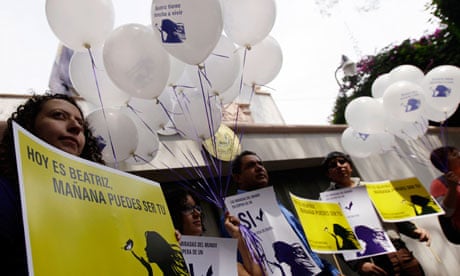El Salvador's supreme court has denied a sick woman an immediate abortion, despite warnings from doctors that her life is at risk and the foetus is likely to survive only a few hours after birth.
In a 4-1 ruling, the nation's highest court turned down a request from the 26-week-pregnant woman, who uses the name Beatriz to protect her identity, and medical staff, who fear prison if they go ahead with a procedure forbidden by one of the world's strict anti-abortion laws. The judgesfinally ruled on Wednesday that "the rights of the mother cannot be privileged over those" of the foetus, citing the national law's "absolute impediment to authorise the practice of abortion".
In El Salvador termination of a pregnancy is illegal even in the case of rape, incest and where there is a threat to the life of the mother. This law is widely supported in the Central American nation, but Beatriz's appeal has set bishops and anti-abortion campaigners against the health ministry and women's rights groups.
Three sonograms have confirmed that the foetus is missing large parts of the brain and skull, a condition known as anencephaly. Babies with anencephaly live only a few days.
Beatriz has been diagnosed withlupus disease, which has weakened her kidneys. Thematernity hospital has warned that the risks of haemorrhaging, kidney failure and maternal death will increase as the pregnancy progresses.
In an interview with the Observer last month, the 22-year-old woman called on the outside world for help. "I'm not seriously ill, but I feel bad, because I get really tired and I'm short of breath … I'd like them to interrupt the pregnancy now," she said. "I'd like people to respect my decision. I want to tell them I'd feel better if I was allowed to have an interruption."
She has also recorded a video plea to the president. The health ministry has backed her appeal, along with the United Nations, the Inter-American Commission on Human Rights and pro-choice groups.
But the church lobbied fiercely against an abortion. "This case should not be used to legislate against human life, especially against the unborn," the Episcopal Conference said, claiming that Beatriz was being used by pro-choice campaigners to weaken the country's prohibition.
After requesting additional medical tests, the court accepted that Beatriz suffered from lupus, but said the disease was under control and the threat to the mother's life was "not actual or imminent, but rather eventual". However, it held out the prospect of medical intervention at a later stage if Beatriz's life was deemed in immediate danger. Legal specialists have suggested that the law might tolerate a premature induction if the lives of both mother and foetus are threatened.
Beatriz's lawyer, Víctor Hugo Mata, condemned the decision as "misogynistic", noting that the risks were increasing with each day that passed. "The court placed the life of the anencephalic baby over Beatriz's life," he told the New York Times. "Justice here does not respect the rights of women."
The case has had regional ramifications. The Inter-American Commission on Human Rights urged the El Salvadorian government to take "precautionary measures" by approving an abortion.
Most Latin American countries prohibit abortion, but there have been relaxations in several countries. Uruguay recently legalised first trimester interventions, while Colombia, Brazil and Argentina allow abortion in rape and other extenuating circumstances.
However, San Salvador has moved in the opposite direction. Until 1997, abortion would have been permissible in a case such as Beatriz's, but the prohibition was tightened that year by the Nationalist Republican Alliance party in a bid to win votes from the powerful Catholic lobby.
Since then, around 600 cases have been investigated, leading to 30 imprisonments of up to 30 years on the grounds of infanticide. Nicaragua and Chile also prohibit abortion under all circumstances.Worldwide, almost 70,000 women die annually as a result of unsafe "illegal" abortions, according to the World Health Organisation.
